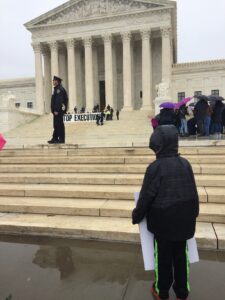 More often than not, what Christians think of as ‘patriotism’ is what God defines as ‘idolatry.’
More often than not, what Christians think of as ‘patriotism’ is what God defines as ‘idolatry.’
Jesus once said, “render to Caesar the things that are Caesar’s, and to God the things that are God’s” (Matthew 22:21), a radical statement publicly declaring that Caesar and Rome weren’t God, and were so disconnected that they required two separate offerings. While many contemporary Christians use the verse to defend the idea that God is pro-government, (or more specifically, pro their preferred brand of government) Jesus is warning us to avoid such thinking.
Romans 13:1 is also often used by people to defend their political allegiances: Let every person be subject to the governing authorities. For there is no authority except from God, and those that exist have been instituted by God. But all of these texts have a major caveat, where the authors are presupposing that this “submitting” is coinciding—and never contradicting—the supreme call to love God and love others. This becomes obvious when looking at other passages that explicitly say so:
Teacher, which is the great commandment in the Law?” And he said to him, “You shall love the Lord your God with all your heart and with all your soul and with all your mind. This is the great and first commandment. And a second is like it: You shall love your neighbor as yourself. On these two commandments depend all the Law and the Prophets. (Matthew 22: 36-40)
Christians using Romans 13 as a defense to support various political viewpoints at the expense of loving others are also ignoring the words of Peter when he tells the apostles, “We must obey God rather than men” (Acts 5:29) and the teachings of Jesus himself when he proclaimed “no one can serve two masters” (Matthew 6:24).
Separating king and country is difficult for modern American Christians to comprehend because too often we incorporate nationalism and patriotism into much of our religious expression, and even our faith. It’s not uncommon for churches to celebrate the Fourth of July, adorn their sanctuaries with American flags, and incorporate America and American nationalism into songs of worship. But for the very first followers of Jesus, these types of ideals and symbols would be alarming and even considered blasphemous.
Separating king and country is difficult for modern American Christians to comprehend because too often we incorporate nationalism and patriotism into much of our religious expression, and even our faith.
The challenge for Christians is to simultaneously honor the virtues of sacrifice, service and freedom without idolizing the sin of nationalism, to celebrate bravery without romanticizing violence, and to realize that our salvation comes from the Prince of Peace and not the wars of men.
We may think it’s no big deal that our country’s flag stands alongside a pastor onstage, but try to imagine the apostle Paul and the earliest churches pledging their allegiance to Caesar and the conquering legions who were slaughtering anybody who stood in their way. As citizens of the United States, we’re trying to follow Christ within a similar context as the earliest Christians—living within a powerful empire, and susceptible to state-sponsored religion, where it’s socially, politically, and economically advantageous to adhere to certain political beliefs and leaders—even to the point of becoming a pseudo-theocracy.
Unfortunately, Christians have been historically gullible to nationalistic “Christianity,” and often treat our faith as a civic religion where we can establish a voting bloc and create enough influence to legislate laws, gain wealth, and consolidate power rather than sacrificially serve and love others.
“American Christianity” perverts the life and mission of Jesus, because instead of forgiving enemies the state spends billions of dollars to kill them, instead of caring for the poor we villainize them, instead of accepting the foreigner we ban them, and instead of helping the oppressed we further alienate them. While it’s clearly possible to be both an American and a Christian, we must realize that the goals of our country’s government and those of Christ are rarely the same, and often directly contradict each other.
While it’s clearly possible to be both an American and a Christian, we must realize that the goals of our country’s government and those of Christ often directly contradict each other.
Patriotic-fueled faith is susceptible to hypocrisy and sin. It may publicly criticize those who kneel during a national anthem, but be conspicuously silent when a political leader mocks POWs. It may claim to worship a man who was tortured to death on a cross, but have no qualms about the government torturing people made in the image of God for the sake of “national security.” It may celebrate the “brave history” of a country, but simultaneously overlook its horrific crimes. It will pridefully glorify its own country, while vilifying others.
A faith hindered by patriotism is highly selective and irrationally loyal according to partisan opinions. But perhaps the most heart-wrenching part of “nationalistic” Christianity is that it narrowly restricts our faith to those within a very small tribe. The Kingdom of God goes far beyond America, and the family of Christ is made up of countless nationalities, races, cultures, and ethnicities. Somehow, the same theological rationalizations for being patriotic and pro-America never seem to apply to Christians living in Syria, Iran, Iraq, Russia, China, or North Korea. Are citizens of those countries also expected to honor and submit to their governing authorities?
When anyone or anything “attacks” or “disrespects” America or our “American Ideals,” sadly, many churches and faith communities will automatically revert to “Patriotism mode,” singing “God Bless America” while hardly giving a second thought to the countless lives—many of which are fellow believers in Christ, and all of which are made in the Divine image of God—being impacted by our state-sponsored violence and national policies.
All Christians are dual citizens, requiring us to choose which kingdom we’ll ultimately prioritize. Sometimes we must lay down a flag in order to carry a cross.
For the early church, sometimes being a good Christian meant being a bad Roman. So before accusing someone of being unpatriotic, ask which empire they’re serving.
God help us.
Stephen Mattson is the author of The Great Reckoning: Surviving a Christianity That Looks Nothing Like Christ. This article originally appeared on the Huffington Post.



6 Responses
Excellent.
Well done! You’ve just said what my whole family has been saying, backed up by what we’ve experienced. (For instance, a government budget decision in the 1990’s made all 4 of us homeless for 6 years – and over a million families jobless, without insurance, and about 3/4 of them homeless too.) Many churches applauded “patriotically,” or agreed that it “strengthened family values.” Did it really? What do you think?
I consider myself a Christian.
This is such a needed truth for most Evangelicals. I adopted America as my home in the early 2000s and was indoctrinated with this fusion of State and Faith doctrine. It took me 10 years to break free although the whole time I felt something was amiss. Now i am careful how i speak in my home church where the pastors are very entrenched in this belief. They are super loving but some times the political bug creeps in and it makes seem unidentifiable. Their political and patriotic bend totally discredits the life of Christ they generally live. It’s hard to show how this is a stumbling block in their mission. They now identify with this brand of Evangelicalism so much it’s a part of their Faith system. Most of the congregation dont have this same Faith system.
This article is very close to how i try to Express the dangers of this slippery slope into Patriotic idolatry.
Saying I pledge allegiance to the flag is idolatry. Our allegiance belongs to God. We are called to preach the gospel in all the world.